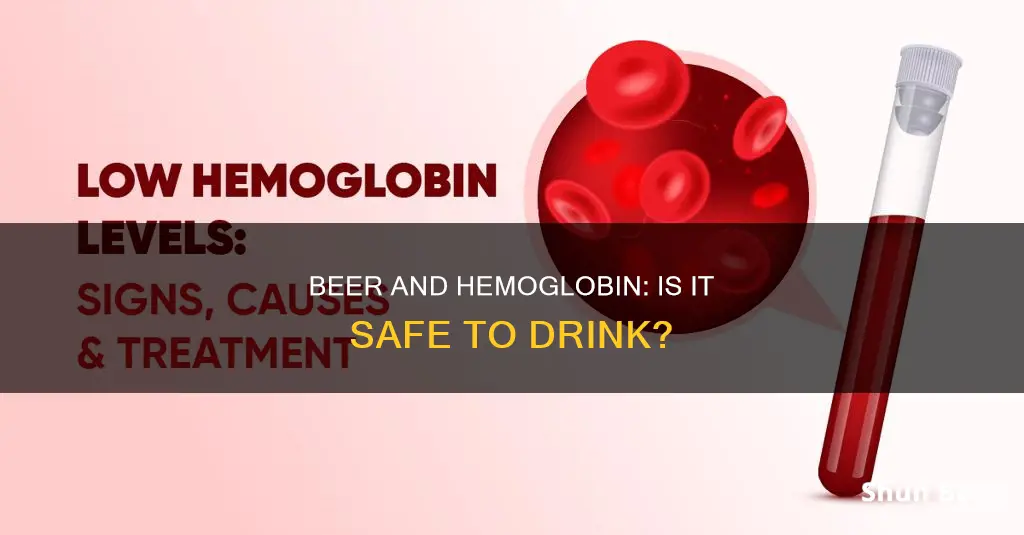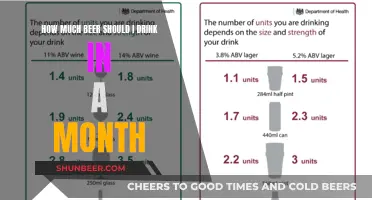
Drinking alcohol in moderation typically won't impact your iron levels, but chronic alcohol abuse can cause anemia. Alcohol can affect the production of red blood cells and lower the number of precursor cells in the bone marrow. It can also cause nutritional deficiencies, including iron, folate, and vitamin B12, which are essential for producing red blood cells. Heavy drinking can lead to various types of anemia, including megaloblastic anemia, sideroblastic anemia, and iron deficiency anemia. If you have anemia, it's best to avoid alcohol as it can worsen symptoms.
| Characteristics | Values |
|---|---|
| Can alcohol cause anemia? | Yes, heavy alcohol consumption can lead to the development of anemia. |
| How does alcohol cause anemia? | Alcohol affects the production of red blood cells and can cause nutrient deficiencies, including iron, folate, and vitamin B12. |
| What are the symptoms of anemia? | Difficulty concentrating or thinking clearly, strong desire to eat ice or other non-food items (pica), rapid or irregular heartbeat, weakness, fatigue, etc. |
| What are the health risks associated with anemia? | Heart problems, liver damage, low immunity, heart failure, brain damage, pregnancy complications, etc. |
| Can people with anemia drink alcohol? | There is no definitive answer. Some people with mild anemia may be able to drink in moderation without adverse effects, while others may find that alcohol exacerbates their symptoms. |
| What are the risks of drinking alcohol with anemia? | Alcohol can worsen anemia symptoms and cause serious side effects, including decreased red blood cell production, gastrointestinal bleeding, nutritional deficiencies, etc. |
| How can anemia be treated? | By addressing nutritional deficiencies, taking supplements, receiving blood transfusions, or in some cases, undergoing medical treatment for underlying conditions. |
| How can alcohol-induced anemia be treated? | By abstaining from alcohol consumption, improving diet, and taking supplements to correct nutritional deficiencies. |
What You'll Learn

Alcohol can negatively impact iron absorption
Iron is an essential mineral that plays a crucial role in the production of hemoglobin, a protein that transports oxygen from your lungs to the rest of your body. Heavy alcohol consumption can affect iron metabolism and reduce your body's ability to absorb iron, leading to iron deficiency anemia. Additionally, alcohol can cause gastrointestinal bleeding, which can deplete iron stores in the body.
The impact of alcohol on iron absorption was studied in 70 subjects, and it was found that the presence of alcohol decreased iron absorption significantly. The mean iron absorption of a test dose was 24.44%, while in the presence of whisky, absorption fell to 9.73%. This indicates that alcohol negatively influences the body's ability to absorb iron.
Chronic alcohol consumption is also associated with an increased risk of developing anemia due to nutritional deficiencies. People who drink heavily often have inadequate diets and may not consume enough iron-rich foods. Alcohol can also damage the lining of the digestive tract, further impairing the absorption of nutrients like iron, calcium, magnesium, and zinc, as well as vitamins A, C, D, E, K, and B.
Heavy drinking can also lead to iron overload in the body, which can be dangerous and cause liver damage or even contribute to the onset of cancer. Therefore, it is important to limit alcohol intake or seek help to quit drinking if you are struggling with alcohol abuse.
Drinking Beer at Work: Is It Ever Okay?
You may want to see also

Heavy drinking can lead to iron deficiency
Secondly, heavy alcohol consumption can cause gastrointestinal bleeding, which leads to iron deficiency as blood contains iron. Chronic or severe blood loss depletes the body's iron stores, and if this loss is not replaced through diet, it can lead to anemia.
Thirdly, heavy drinking can result in increased urinary excretion, diarrhea, and vomiting, all of which contribute to nutrient deficiencies, including iron deficiency.
Additionally, when a large proportion of a person's caloric intake comes from alcohol, they may not be consuming enough iron-rich foods, leading to a diet lacking in iron.
Finally, heavy alcohol use can cause liver damage, which can also interfere with iron absorption and utilization.
It is important to note that while light or moderate drinking may not significantly impact iron levels, heavy drinking is a significant risk factor for iron deficiency and the associated health complications.
Beer and Prozac: Safe Mix or Risky Business?
You may want to see also

Alcohol can cause anaemia
Anaemia is a condition that affects the blood, causing a person to lack enough red blood cells to carry oxygen throughout the body. This can lead to weakness, low immunity, or even heart failure. Heavy drinking can lead to the development of anaemia in several ways. Firstly, alcohol impacts the production of red blood cells and lowers the number of precursor cells in the bone marrow. As a result, fewer mature red blood cells are created, and those that are created may be structurally abnormal and dysfunctional.
Alcohol's Impact on Nutrient Absorption
The body needs iron from food to produce haemoglobin, which carries oxygen to the muscles. Chronic alcohol use can interfere with the body's ability to absorb folate (vitamin B9), which is necessary for creating new red blood cells. Heavy alcohol use can also impact vitamin C absorption, a vitamin that helps the body absorb iron. Therefore, heavy drinking can lead to iron and folic acid deficiencies, which are necessary for proper haemoglobin function.
Alcohol and Excess Iron
Interestingly, heavy alcohol use can also cause excess iron levels in the body. Alcohol interferes with the liver's production of hepcidin, a hormone that regulates iron metabolism. This can lead to a build-up of ferritin, a protein that stores iron in the cells, which may result in liver disease.
Alcohol's Impact on Dietary Choices
Alcohol can also cause people to make poor dietary choices, such as opting for sugary mixed drinks instead of iron-rich foods. High blood sugar levels have been linked to an increased risk of anaemia.
Alcohol's Impact on Blood Clotting
Anaemia in alcoholics can cause clotting problems due to decreased red blood cell and platelet levels. This can lead to an increased risk of nosebleeds and even life-threatening conditions like strokes.
Alcohol's Impact on the Gastrointestinal System
Excessive drinking of alcohol affects the gastrointestinal system, preventing the proper absorption of nutrients in the intestines. This reduction in nutrients prevents the bone marrow from producing healthy red blood cells.
Alcohol's Impact on the Liver
Alcohol abuse negatively impacts the liver, causing a fatty buildup and inflammation, which can lead to liver disease. Liver disease changes the way the body manages red blood cells.
Treating Alcohol-Related Anaemia
When anaemia is caused by alcohol consumption, abstaining from alcohol will usually improve red blood cell counts. In cases of nutritional deficiency, taking supplements may be helpful, such as folate or vitamin B12.
Preventing Alcohol-Related Anaemia
The best way to prevent anaemia is to moderate alcohol consumption. For those experiencing alcohol dependency, a rehabilitation program may be necessary.
Cheers to Real Beer: What the Cast Really Drank
You may want to see also

Alcohol can increase iron levels
Alcohol can indeed increase iron levels in the body. This is due to its effect on hepcidin, a hormone produced by the liver that regulates iron metabolism. Alcohol interferes with hepcidin's role, allowing more iron to enter the body.
However, this does not necessarily mean that drinking alcohol will improve your health if you have low hemoglobin. While moderate alcohol consumption may not put you at a major risk of anemia or iron deficiency, heavy alcohol consumption can cause a range of adverse health effects, including suppressing blood cell production and causing red blood cell abnormalities. It can also lead to nutritional deficiencies, including iron deficiency, as well as deficiencies in other essential vitamins and minerals.
Additionally, excessive alcohol consumption can cause hemochromatosis, a dangerous condition in which iron levels are too high. This condition is linked not only to liver disease but also to damage to the pancreas, heart, endocrine glands, and joints.
Therefore, while alcohol may technically increase iron levels, it is not a safe or recommended way to address low hemoglobin. If you are concerned about your hemoglobin levels, it is best to consult a healthcare professional for advice.
Exploring Beer Enhancement With Bazooka Tubes
You may want to see also

Alcohol can negatively impact vitamin absorption
Additionally, alcohol interferes with the transport of some nutrients into the bloodstream and alters the storage and excretion of nutrients, preventing their full utilization by the body. Alcohol also disrupts the body's microbiome, which plays a role in synthesizing specific vitamins.
Chronic heavy drinking can lead to vitamin deficiencies, including vitamins A, C, D, E, K, and B vitamins. For example, alcohol can cause a deficiency in thiamine (vitamin B1) by depleting reserves through liver damage, malnutrition, and malabsorption. It can also interfere with the absorption of folate (vitamin B9) and increase its excretion through urination.
Heavy alcohol use can also impact vitamin C absorption. While vitamin C is important for iron absorption, heavy drinking can impede this process. This is significant as iron is necessary for the production of hemoglobin, which carries oxygen in the blood.
Overall, alcohol's negative impact on vitamin absorption can contribute to nutritional deficiencies and worsen conditions like anemia. Therefore, it is important to moderate alcohol consumption and ensure adequate vitamin intake through a balanced diet or supplements.
Will Beer Affect Your Blood Test?
You may want to see also







